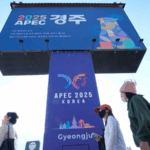As the Asia-Pacific region prepares for the 2025 APEC Economic Leaders' Meeting in the Republic of Korea, China's Global Governance Initiative (GGI) is emerging as a potential catalyst for achieving the forum's sustainability goals. With themes of connectivity, innovation, and prosperity dominating regional dialogues, analysts suggest the GGI's framework could address critical challenges facing multilateral cooperation.
Addressing the Governance Deficit
The current global governance system faces unprecedented strain from shifting power dynamics and geopolitical tensions. APEC members confront pressing issues including digital inequality, climate change impacts, and supply chain vulnerabilities – challenges requiring coordinated solutions beyond traditional approaches.
GGI's Three-Pronged Alignment
China's initiative proposes concrete measures resonating with APEC's 2025 agenda:
1. Connectivity Through Multilateralism: The GGI strengthens existing frameworks like the Regional Comprehensive Economic Partnership (RCEP) through enhanced trade standardization and infrastructure development. Projects like the Jakarta-Bandung High-Speed Railway demonstrate physical integration efforts, while the initiative's governance protocols aim to streamline cross-border cooperation.
2. Innovation Through Inclusive Growth: With China's digital economy representing 41% of its GDP in 2022, the GGI prioritizes developing nations' access to emerging technologies. The framework advocates against technological monopolies while establishing security standards for artificial intelligence and data management.
3. Prosperity Through Diversification: The initiative promotes resilient supply chains through production network diversification rather than exclusive economic blocs, offering developing economies greater participation in regional value chains.
Road to 2026 APEC Leadership
As China prepares to assume APEC chairmanship in 2026, observers note the GGI's potential to bridge development gaps within the region. The initiative's emphasis on respecting national sovereignty and diverse development models presents both opportunities and challenges for consensus-building among APEC's 21 members.
Reference(s):
Why APEC's success needs China's Global Governance Initiative
cgtn.com







